虚拟语气用法总结(超好,原创)
(完整版)英语虚拟语气语法归纳总结
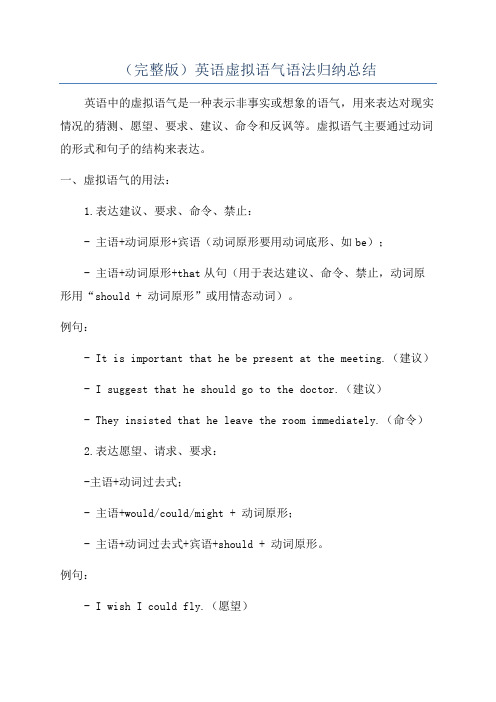
(完整版)英语虚拟语气语法归纳总结英语中的虚拟语气是一种表示非事实或想象的语气,用来表达对现实情况的猜测、愿望、要求、建议、命令和反讽等。
虚拟语气主要通过动词的形式和句子的结构来表达。
一、虚拟语气的用法:1.表达建议、要求、命令、禁止:- 主语+动词原形+宾语(动词原形要用动词底形、如be);- 主语+动词原形+that从句(用于表达建议、命令、禁止,动词原形用“should + 动词原形”或用情态动词)。
例句:- It is important that he be present at the meeting.(建议)- I suggest that he should go to the doctor.(建议)- They insisted that he leave the room immediately.(命令)2.表达愿望、请求、要求:-主语+动词过去式;- 主语+would/could/might + 动词原形;- 主语+动词过去式+宾语+should + 动词原形。
例句:- I wish I could fly.(愿望)- I would appreciate it if you could help me.(请求)3.表示虚拟条件:- If条件从句中的谓语动词用过去完成时,主句用would/should/might/could + have + 过去分词;- If条件从句中的谓语动词用过去时,主句用would/should/could + 动词原形。
例句:- If I had known his phone number, I would have called him.(虚拟条件)- If you had listened to me, we could have finished the project earlier.(虚拟条件)4.表达建议、要求、祝愿:- If only内部称述 + 主语 + 过去式。
虚拟语气用法总结(超好)
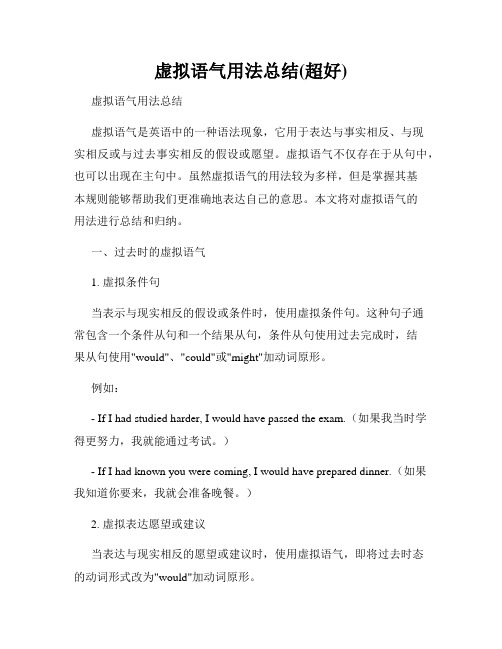
虚拟语气用法总结(超好)虚拟语气用法总结虚拟语气是英语中的一种语法现象,它用于表达与事实相反、与现实相反或与过去事实相反的假设或愿望。
虚拟语气不仅存在于从句中,也可以出现在主句中。
虽然虚拟语气的用法较为多样,但是掌握其基本规则能够帮助我们更准确地表达自己的意思。
本文将对虚拟语气的用法进行总结和归纳。
一、过去时的虚拟语气1. 虚拟条件句当表示与现实相反的假设或条件时,使用虚拟条件句。
这种句子通常包含一个条件从句和一个结果从句,条件从句使用过去完成时,结果从句使用"would"、"could"或"might"加动词原形。
例如:- If I had studied harder, I would have passed the exam.(如果我当时学得更努力,我就能通过考试。
)- If I had known you were coming, I would have prepared dinner.(如果我知道你要来,我就会准备晚餐。
)2. 虚拟表达愿望或建议当表达与现实相反的愿望或建议时,使用虚拟语气,即将过去时态的动词形式改为"would"加动词原形。
例如:- I wish I were taller.(我希望我更高。
)- She suggested that he take a bus.(她建议他坐公交车。
)二、现在时的虚拟语气1. 虚拟条件句与过去时的虚拟条件句类似,现在时的虚拟条件句也包含一个条件从句和一个结果从句。
条件从句使用"were to"结构或"should"加动词原形,结果从句使用"would"、"could"或"might"加动词原形。
例如:- If I were to win the lottery, I would travel the world.(如果我中了彩票,我会周游世界。
虚拟语气用法大全
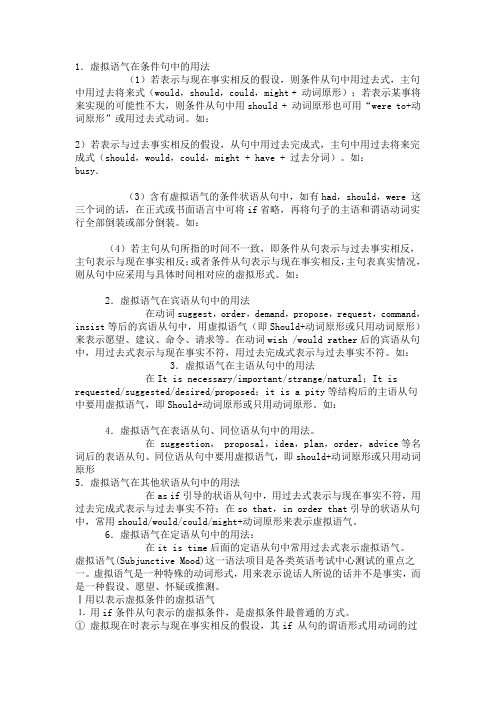
1.虚拟语气在条件句中的用法(1)若表示与现在事实相反的假设,则条件从句中用过去式,主句中用过去将来式(would,should,could,might + 动词原形);若表示某事将来实现的可能性不大,则条件从句中用should + 动词原形也可用“were to+动词原形”或用过去式动词。
如:2)若表示与过去事实相反的假设,从句中用过去完成式,主句中用过去将来完成式(should,would,could,might + have + 过去分词)。
如:busy.(3)含有虚拟语气的条件状语从句中,如有had,should,were 这三个词的话,在正式或书面语言中可将if省略,再将句子的主语和谓语动词实行全部倒装或部分倒装。
如:(4)若主句从句所指的时间不一致,即条件从句表示与过去事实相反,主句表示与现在事实相反;或者条件从句表示与现在事实相反,主句表真实情况,则从句中应采用与具体时间相对应的虚拟形式。
如:2.虚拟语气在宾语从句中的用法在动词suggest,order,demand,propose,request,command,insist等后的宾语从句中,用虚拟语气(即Should+动词原形或只用动词原形)来表示愿望、建议、命令、请求等。
在动词wish /would rather后的宾语从句中,用过去式表示与现在事实不符,用过去完成式表示与过去事实不符。
如:3.虚拟语气在主语从句中的用法在It is necessary/important/strange/natural;It is requested/suggested/desired/proposed;it is a pity等结构后的主语从句中要用虚拟语气,即Should+动词原形或只用动词原形。
如:4.虚拟语气在表语从句、同位语从句中的用法。
在 suggestion, proposal,idea,plan,order,advice等名词后的表语从句、同位语从句中要用虚拟语气,即should+动词原形或只用动词原形5.虚拟语气在其他状语从句中的用法在as if引导的状语从句中,用过去式表示与现在事实不符,用过去完成式表示与过去事实不符;在so that,in order that引导的状语从句中,常用should/would/could/might+动词原形来表示虚拟语气。
高中必备知识点解析虚拟语气的形式与用法

高中必备知识点解析虚拟语气的形式与用法虚拟语气是高中英语必备的语法知识点之一。
它在英语中经常被用于表达假设、愿望、建议、命令和推测等情态,通过使用虚拟语气,可以使语言更加丰富和准确。
本文将深入解析虚拟语气的形式与用法。
一、虚拟语气的形式1. 虚拟语气的一般现在时:用于表示与现在事实相反的情况。
其结构为:主语+动词原形(倒装)。
例如:If I were you, I would study harder.(如果我是你,我会更加努力学习。
)2. 虚拟语气的一般过去时:用于表示与过去事实相反的情况。
其结构为:主语+动词过去式(倒装)。
例如:If I had seen her yesterday, I would have said hello.(如果我昨天见到她,我会问好的。
)3. 虚拟语气的过去完成时:用于表示对过去情况的猜测或不可能发生的情况。
其结构为:主语+动词过去完成式(倒装)。
例如:I wish I had studied harder for the exam.(我希望我为考试努力学习。
)二、虚拟语气的用法1. 表达假设与条件:If I were you, I would travel around the world.(如果我是你,我会环游世界。
)I wish I had a million dollars.(我希望我有一百万美元。
)2. 表达愿望与建议:I wish you would stop smoking.(我希望你戒烟。
)It's important that she arrive on time.(她按时到达很重要。
)3. 表达命令与要求:The teacher ordered that the students be quiet.(老师要求学生们保持安静。
)She insisted that he leave immediately.(她坚持要他立刻离开。
)4. 表达推测与猜测:He looks as if he were sick.(他看起来像是生病了。
虚拟语气的用法归纳
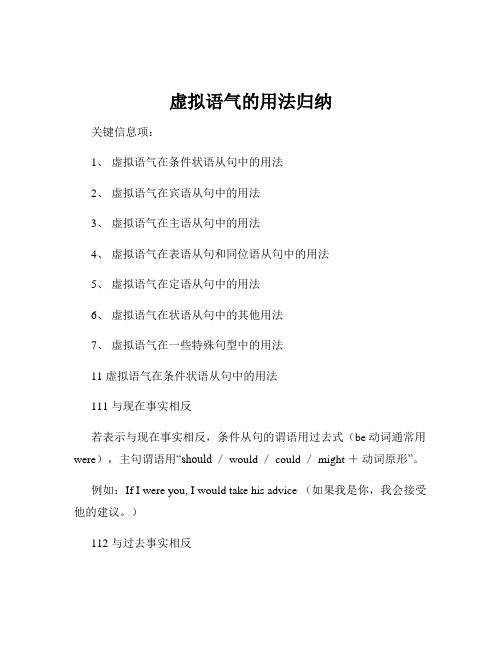
虚拟语气的用法归纳关键信息项:1、虚拟语气在条件状语从句中的用法2、虚拟语气在宾语从句中的用法3、虚拟语气在主语从句中的用法4、虚拟语气在表语从句和同位语从句中的用法5、虚拟语气在定语从句中的用法6、虚拟语气在状语从句中的其他用法7、虚拟语气在一些特殊句型中的用法11 虚拟语气在条件状语从句中的用法111 与现在事实相反若表示与现在事实相反,条件从句的谓语用过去式(be 动词通常用were),主句谓语用“should / would / could / might +动词原形”。
例如:If I were you, I would take his advice (如果我是你,我会接受他的建议。
)112 与过去事实相反若表示与过去事实相反,条件从句的谓语用过去完成式(had +过去分词),主句谓语用“should / would / could / might + have +过去分词”。
比如:If you had come earlier, you would have caught the bus (如果你早点来,你就赶上公交车了。
)113 与将来事实相反若表示与将来事实相反,条件从句的谓语有三种形式:过去式(be 动词通常用 were)should +动词原形were to +动词原形主句谓语用“should / would / could / might +动词原形”。
例如:If it were to rain tomorrow, we would stay at home (如果明天下雨,我们就待在家里。
)12 虚拟语气在宾语从句中的用法121 wish 后的宾语从句wish 后的宾语从句要用虚拟语气。
与现在事实相反,用一般过去时;与过去事实相反,用过去完成时;与将来事实相反,用“would / could +动词原形”。
例如:I wish I were as tall as you (我希望和你一样高。
英语虚拟语气的基本用法归纳(优秀9篇)
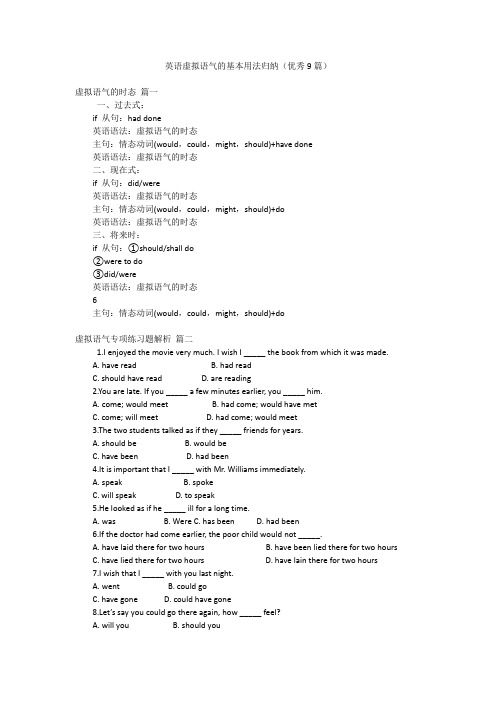
英语虚拟语气的基本用法归纳(优秀9篇)虚拟语气的时态篇一一、过去式:if 从句:had done英语语法:虚拟语气的时态主句:情态动词(would,could,might,should)+have done英语语法:虚拟语气的时态二、现在式:if 从句:did/were英语语法:虚拟语气的时态主句:情态动词(would,could,might,should)+do英语语法:虚拟语气的时态三、将来时:if 从句:①should/shall do②were to do③did/were英语语法:虚拟语气的时态6主句:情态动词(would,could,might,should)+do虚拟语气专项练习题解析篇二1.I enjoyed the movie very much. I wish I _____ the book from which it was made.A. have readB. had readC. should have readD. are reading2.You are late. If you _____ a few minutes earlier, you _____ him.A. come; would meetB. had come; would have metC. come; will meetD. had come; would meet3.The two students talked as if they _____ friends for years.A. should beB. would beC. have beenD. had been4.It is important that I _____ with Mr. Williams immediately.A. speakB. spokeC. will speakD. to speak5.He looked as if he _____ ill for a long time.A. wasB. WereC. has beenD. had been6.If the doctor had come earlier, the poor child would not _____.A. have laid there for two hoursB. have been lied there for two hoursC. have lied there for two hoursD. have lain there for two hours7.I wish that I _____ with you last night.A. wentB. could goC. have goneD. could have gone8.Let’s say you could go there again, how _____ feel?A. will youB. should youC. would youD. do you9.I can’t stand him. He always talks as though he _____ everything.A. knewB. knowsC. has knownD. had known10._____ the fog, we should have reached our school.A. Because ofB. In spite ofC. In case ofD. But for11.If you had told me in advance, I _____ him at the airport.A. would meetB. would had metC. would have metD. would have meet12.Mike can take his car apart and put it back together again. I certainly wish he_____ me how.A. teachesB. will teachC. has taughtD. would teach13.I would have told him the answer, had it been possible, but I _____ so busy then.A. had beenB. wereC. wasD. would be14.He’s working hard for fear that he _____.A. should fall behindB. fell behindC. may fall behindD. would fallen behind15.If it _____ another ten minutes, the game would have been called off.A. had rainedB. would have rainedC. have seenD. rained16.He suggested that they _____ use a trick instead of fighting.A. shouldB. wouldC. doD. had17.My father did not go to New York; the doctor suggested that he _____ there.A. not wentB. won’t goC. not goD. not to go18.I would have gone to the meeting if I _____ time.A. had hadB. have hadC. hadD. would have had19.Would you rather I _____ buying a new bike?A. decided againstB. will decide againstC. have decidedD. shall decide against20.You look so tired tonight. It is time you _____.A. go to sleepB. went to sleepC. go to bedD. went to bed21、—Why didn’t you buy a new car?—I would have bought one if I _____ enough money.A. hadB. have hadC. would haveD. had had22.If she could sew, _____.A. she make a dressB. she would have made a shirtC. she will make a shirtD. she would had made a coat23._____ today, he would get there by Friday.A. Would he leaveB. Was he leavingC. Were he to leaveD. If he leaves24.His doctor suggested that he _____ a short trip abroad.A. will takeB. would takeC. takeD. took25.The Bakers arrived last night. If they’d only let us know earlier,_____ at the station.A. we’d meet themB. we’ll meet themC. we’d have met themD. we’ve met them26.If I _____ you, I _____ more attention to English idioms and phrases.A. was; shall payB. am; will payC. would be; would payD. were; would pay27.We might have failed if you _____ us a helping hand.A. have not givenB. would not giveC. had not givenD. did not give28.The law requires that everyone _____ his car checked at least once a year.A. hasB. hadC. haveD. will have29.It is strange that he _____ so.A. would sayB. would speakC. should sayD. will speak30.Had I known her name, _____A. or does she know mine?B. and where does she live?C. she would be beautiful.D. I would have invited her to lunch.31.He has just arrived, but he talks as if he _____ all about that.A. knowB. knowsC. knownD. knew32.If I _____ the money, I would have bought a much bigger car.A. possessedB. ownedC. hadD. had had33.He was very busy yesterday; otherwise, he _____ to the meeting.A. would comeB. cameC. would have comeD. will come34.The librarian insists that John _____ no more books from the library before he returns all the books he has borrowed.A. will takeB. tookC. takeD. takes35.I left very early last night, but I wish I _____ so early.A. didn’t leaveB. hadn’t leftC. haven’t leftD. couldn’t leave36.I do not have a job. I would find one but I _____ no time.A. hadB. didn’t haveC. had hadD. have37.I wish that you _____ such a bad headache because I’m sure that you would have enjoyed the concert.A. hadn’tB. didn’t have hadC. hadn’t hadD. hadn’t have38.He insisted that we all _____ in his office at one o’clock.A. beB. to beC. would beD. shall be39.Helen couldn’t go to France after all. That’s too bad. I’m sure she would have enjoyed it if _____.A. she’s goneB. she’ll goC. she’d goneD. she’d go答案:1—5 BBDAD 6—10 DDCAD11—15 CDCAA 16—20 ACAAD21—25 DBCCC 26—30 DCCCD31—35 DDCCB 36—39 DCAC解析:1.wish后面用虚拟语气,表示与过去事实相反用过去完成时。
虚拟语气用法汇总

虚拟语气用法汇总一、虚拟语气在条件句中eg: If I had time, I would attend the meeting.If he had hurried, he could have caught the train.If I were to go abroad, I would go to America.注意:虚拟语气中的省略在条件句中,可省略if,把were ,had, should 提到句首,变为倒装句式.If I were at school again, I would study harder.Were I at school again, I would study harder.If you had come earlier, you would have met him.Had you come earlier, you would have met him.If it should rain tomorrow, we would not go climbing.Should it rain tomorrow, we would not go climbing.二、虚拟语气在名词从句中的运用(1)用于宾语从句1、用于wish后面的宾语从句中。
一般用虚拟语气,表示一种不可能实现的愿望。
其谓语动词形式为:表现在→过去时表过去→过去完成时表将来→would, might, could+动词原形I wish (that) I were a bird.I wish (that) I had seen the film last night.I wish (that) I would/could go.2、用于表示命令、建议、要求等一类词后面的宾语从句中谓语动词用:(should)+ 动词原形。
insist, order, command, suggest, advise, propose, require, request, demand, desire etc. We suggested that the meeting (should) be put off.They insisted that the boy (should) go with them.注意:suggest 当表示“暗示、表明“讲时,insist 表示“坚持认为”之意时,应用陈述语气。
虚拟语气用法总结(完整)
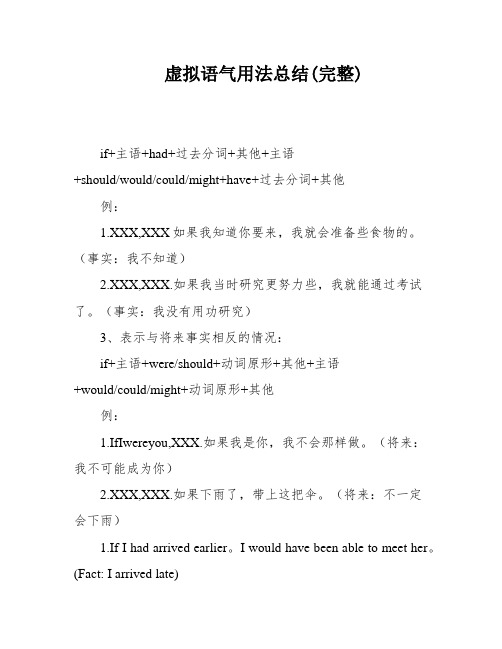
虚拟语气用法总结(完整)if+主语+had+过去分词+其他+主语+should/would/could/might+have+过去分词+其他例:1.XXX,XXX如果我知道你要来,我就会准备些食物的。
(事实:我不知道)2.XXX,XXX.如果我当时研究更努力些,我就能通过考试了。
(事实:我没有用功研究)3、表示与将来事实相反的情况:if+主语+were/should+动词原形+其他+主语+would/could/might+动词原形+其他例:1.IfIwereyou,XXX.如果我是你,我不会那样做。
(将来:我不可能成为你)2.XXX,XXX.如果下雨了,带上这把伞。
(将来:不一定会下雨)1.If I had arrived earlier。
I would have been able to meet her。
(Fact: I arrived late)2.If he had XXX my advice。
he would not have made such a mistake。
(Fact: He didn't listen to me)3.If he were to come here tomorrow。
I would talk to him。
(Fact: It's XXX he will come)In expressing ns。
orders。
requests。
etc。
the subjunctive mood is often used in the object clause。
with the verb in the form of "should + infinitive," which can be omitted.Other uses of XXX:1.The subjunctive mood is used in the object clause after "wish" to express a XXX fact。
虚拟语气的用法和表示方式
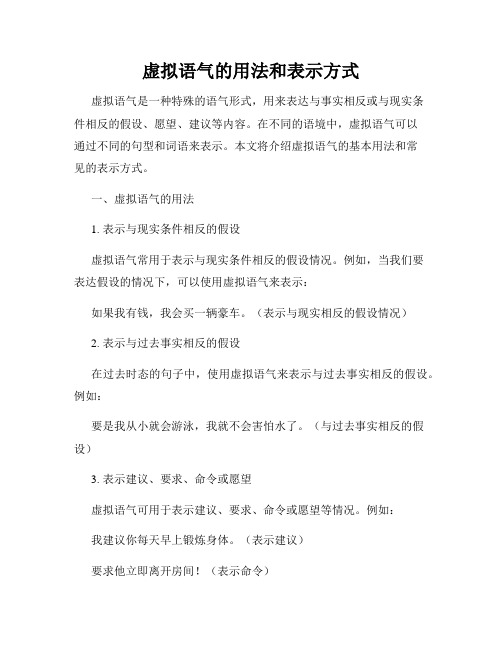
虚拟语气的用法和表示方式虚拟语气是一种特殊的语气形式,用来表达与事实相反或与现实条件相反的假设、愿望、建议等内容。
在不同的语境中,虚拟语气可以通过不同的句型和词语来表示。
本文将介绍虚拟语气的基本用法和常见的表示方式。
一、虚拟语气的用法1. 表示与现实条件相反的假设虚拟语气常用于表示与现实条件相反的假设情况。
例如,当我们要表达假设的情况下,可以使用虚拟语气来表示:如果我有钱,我会买一辆豪车。
(表示与现实相反的假设情况)2. 表示与过去事实相反的假设在过去时态的句子中,使用虚拟语气来表示与过去事实相反的假设。
例如:要是我从小就会游泳,我就不会害怕水了。
(与过去事实相反的假设)3. 表示建议、要求、命令或愿望虚拟语气可用于表示建议、要求、命令或愿望等情况。
例如:我建议你每天早上锻炼身体。
(表示建议)要求他立即离开房间!(表示命令)愿你新年快乐!(表示愿望)二、虚拟语气的表示方式1. 使用虚拟词或词组在表示虚拟语气时,常使用一些特定的虚拟词或词组。
例如:如果、要是、假如、希望、愿望、祝愿等。
如果我是你,我会抓住这个机会。
(使用“如果”引导虚拟语气)我希望他能够及时赶到。
(使用“希望”表示虚拟语气)2. 使用过去式或过去完成式在表示与现实条件相反的假设时,可以使用过去式或过去完成式来表示虚拟语气。
例如:如果他不忘记带护照,他就能出境了。
(使用过去式表示虚拟语气)要是你早点告诉我,我就不会错过这个机会了。
(使用过去完成式表示虚拟语气)3. 使用虚拟语气的情态动词情态动词可以用来表示虚拟语气的情况。
例如:如果我能飞,我就能飞到世界的另一端去。
(使用“能”表示虚拟语气)如果我愿意,我就参加明天的会议。
(使用“愿意”表示虚拟语气)综上所述,虚拟语气是一种用来表达与事实相反或与现实条件相反的假设、愿望、建议等内容的语气形式。
其使用方式包括使用虚拟词或词组、使用过去式或过去完成式以及使用虚拟语气的情态动词等。
掌握虚拟语气的用法和表示方式有助于提高语言表达的灵活性和准确性,同时也能使语言更加丰富。
虚拟语气用法

虚拟语气用法虚拟语气,又称“虚拟假设语气”,是指说话者或写作者在表达某种情况时,通过使用特定的语法形式来表示这种情况实际上并不存在或者与事实相反。
虚拟语气在英语中非常常见,它可以用来表达假设、愿望、建议、命令、推测等多种语境。
本文将介绍虚拟语气的各种用法及例句。
一、假设与现实相反的情况虚拟语气常用于表示与现实相反的情况或假设。
在这种情况下,谓语动词常以“would/could/should + 动词原形”或“were + 主语”等形式出现。
1. 虚拟语气用于假设:If I were rich, I would travel around the world.如果我有钱,我会环游世界。
If she had studied harder, she could have passed the exam.如果她学得更努力,她本来可以通过考试的。
2. 虚拟语气用于愿望:I wish I were taller.我希望我更高一些。
I wish you wouldn't be late for the meeting.我希望你不要迟到开会。
3. 虚拟语气用于建议:I suggest that he should see a doctor.我建议他去看医生。
It is recommended that every student study English.建议每个学生都学习英语。
二、与过去事实相反的情况虚拟语气还常用于表示与过去事实相反的情况。
在这种情况下,主要使用“had + 过去分词”形式或其他相应的虚拟语气结构。
1. 虚拟语气用于与过去事实相反的条件:If he had arrived earlier, he would have caught the train.如果他早点到,他就能赶上火车了。
If I had known you were coming, I would have prepared dinner.如果我知道你要来,我就会准备晚餐了。
虚拟语气用法总结
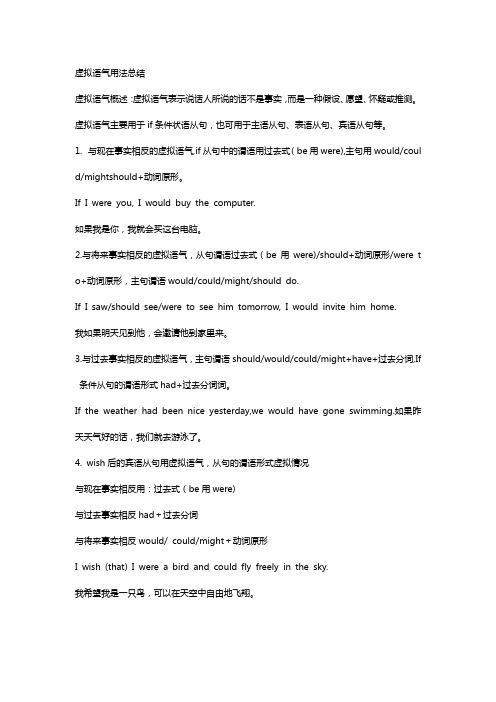
虚拟语气用法总结虚拟语气概述:虚拟语气表示说话人所说的话不是事实,而是一种假设、愿望、怀疑或推测。
虚拟语气主要用于if条件状语从句,也可用于主语从句、表语从句、宾语从句等。
1.与现在事实相反的虚拟语气,if从句中的谓语用过去式(be用were),主句用would/coul d/mightshould+动词原形。
If I were you, I would buy the computer.如果我是你,我就会买这台电脑。
2.与将来事实相反的虚拟语气,从句谓语过去式(be用were)/should+动词原形/were t o+动词原形,主句谓语would/could/might/should do.If I saw/should see/were to see him tomorrow, I would invite him home.我如果明天见到他,会邀请他到家里来。
3.与过去事实相反的虚拟语气,主句谓语should/would/could/might+have+过去分词,If 条件从句的谓语形式had+过去分词词。
If the weather had been nice yesterday,we would have gone swimming.如果昨天天气好的话,我们就去游泳了。
4. wish后的宾语从句用虚拟语气,从句的谓语形式虚拟情况与现在事实相反用:过去式(be用were)与过去事实相反had+过去分词与将来事实相反would/ could/might+动词原形I wish (that) I were a bird and could fly freely in the sky.我希望我是一只鸟,可以在天空中自由地飞翔。
虚拟语气的用法和常见句型
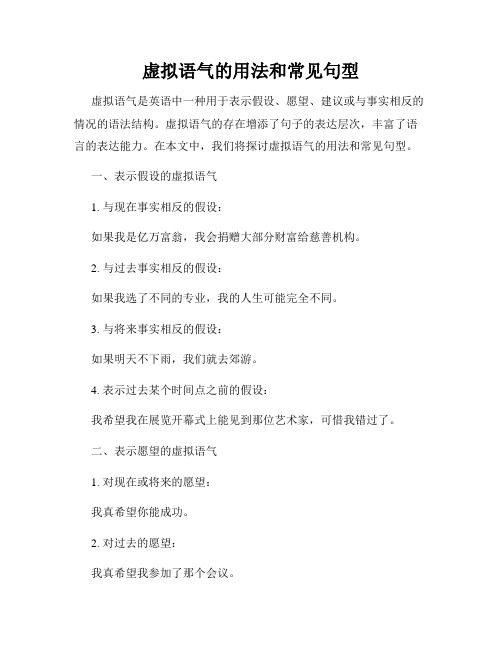
虚拟语气的用法和常见句型虚拟语气是英语中一种用于表示假设、愿望、建议或与事实相反的情况的语法结构。
虚拟语气的存在增添了句子的表达层次,丰富了语言的表达能力。
在本文中,我们将探讨虚拟语气的用法和常见句型。
一、表示假设的虚拟语气1. 与现在事实相反的假设:如果我是亿万富翁,我会捐赠大部分财富给慈善机构。
2. 与过去事实相反的假设:如果我选了不同的专业,我的人生可能完全不同。
3. 与将来事实相反的假设:如果明天不下雨,我们就去郊游。
4. 表示过去某个时间点之前的假设:我希望我在展览开幕式上能见到那位艺术家,可惜我错过了。
二、表示愿望的虚拟语气1. 对现在或将来的愿望:我真希望你能成功。
2. 对过去的愿望:我真希望我参加了那个会议。
三、表示建议的虚拟语气1. 建议:他建议我尽早去见医生。
2. 要求:老师要求我们每天完成作业。
四、常见的虚拟语气句型1. If only... (要是...该多好)If only I were younger, I could join the marathon.(要是我年轻些就好了,我就可以参加马拉松了。
)2. It's time... (是时候...了)It's time we started planning for our summer vacation.(是时候我们开始为暑假计划了。
)3. I wish... (我希望...)I wish I had more time to spend with my family.(我希望我有更多时间陪伴家人。
)4. Suppose... (假设...)Suppose it rains tomorrow, what should we do?(假设明天下雨了,我们该怎么办?)5. If it were not for... (要不是因为...)If it were not for your help, I wouldn't have finished the project on time.(要不是因为你的帮助,我不会按时完成这个项目。
(完整版)虚拟语气用法归纳

虚拟语气(the subjunctive mood)用法归纳第一部分:语气的定义和种类1、语气(mood)语气是动词的一种形式,表示说话人对某一行为或事情的看法和态度。
2、语气的种类⑴陈述语气:表示动作或状态是现实的、确定的或符合事实的,用于陈述句、疑问句和某些感叹句。
如:①There are two sides to every question. 每个问题都有两个方面。
②Were you busy all day yesterday? 昨天一整天你都很忙吗?③How good a teacher she is! 她是多好的一位老师啊!⑵祈使语气:表示说话人对对方的请求或命令。
如:①Never be late again! 再也不要迟到了。
②Don’t forget to turn off the light. 别忘了关灯。
⑶虚拟语气:表示动作或状态不是客观存在的事实,而是说话人的主观愿望、假设或推测等。
如:①If I were a bird, I could fly in the air. 如果我是一只小鸟,我就能在空中飞行。
②I wish I could pass the examination. 我希望我能通过考试。
③May you succeed! 祝您成功!第二部分:简单句中的虚拟语气一、情态动词的过去式用于现在时态时,表示说话人的谦虚、客气、有礼貌、或委婉的语气,常用于日常会话中。
如:⑴Would you be kind enough to show me the way to the post office?请你告诉我去邮局的路好吗?⑵It would be better for you not to stay up too late. 你最好别熬夜到很晚。
二、表祝愿。
1、常用“may+动词原形”表示祝愿,但愿,may须置于句首(多用于正式文体中)。
如:⑴May good luck be yours! 祝你好运!⑵May you be happy! 祝你快乐!⑶May you do even better! 祝你取得更大成就!⑷May you have a good time. 祝愿你玩的痛快。
高中英语语法-虚拟语气全总结
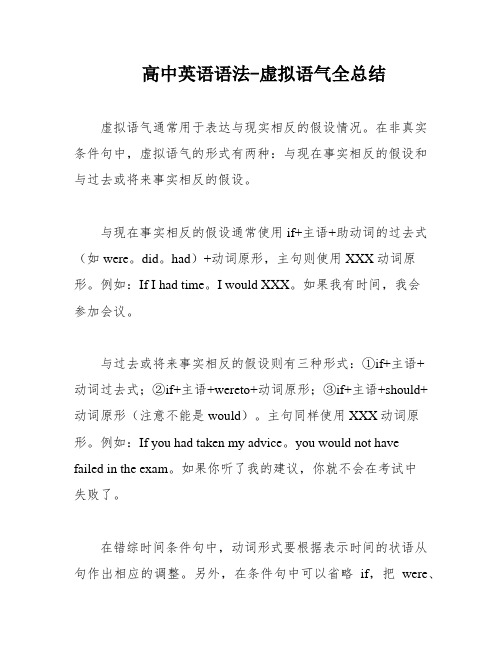
高中英语语法-虚拟语气全总结虚拟语气通常用于表达与现实相反的假设情况。
在非真实条件句中,虚拟语气的形式有两种:与现在事实相反的假设和与过去或将来事实相反的假设。
与现在事实相反的假设通常使用if+主语+助动词的过去式(如were。
did。
had)+动词原形,主句则使用XXX动词原形。
例如:If I had time。
I would XXX。
如果我有时间,我会参加会议。
与过去或将来事实相反的假设则有三种形式:①if+主语+动词过去式;②if+主语+wereto+动词原形;③if+主语+should+动词原形(注意不能是would)。
主句同样使用XXX动词原形。
例如:If you had taken my advice。
you would not have failed in the exam。
如果你听了我的建议,你就不会在考试中失败了。
在错综时间条件句中,动词形式要根据表示时间的状语从句作出相应的调整。
另外,在条件句中可以省略if,把were、had、should提到句首,变成倒装句式。
例如:Were I at school again。
I would study harder。
如果我还有上学的机会,我会更加努力研究。
Had you arrived earlier。
you would have caught the bus.If it rains tomorrow。
XXX climbing.What would you do with a n dollars?We couldn't have finished the work ahead of time without your help.Otherwise。
I would have taken part in the sports meeting.XXX me of your birthday。
or else I would have known nothing about it.A man who s drinking water would be dead in about seven days.I might have been XXX assistance。
虚拟语气用法知识点总结
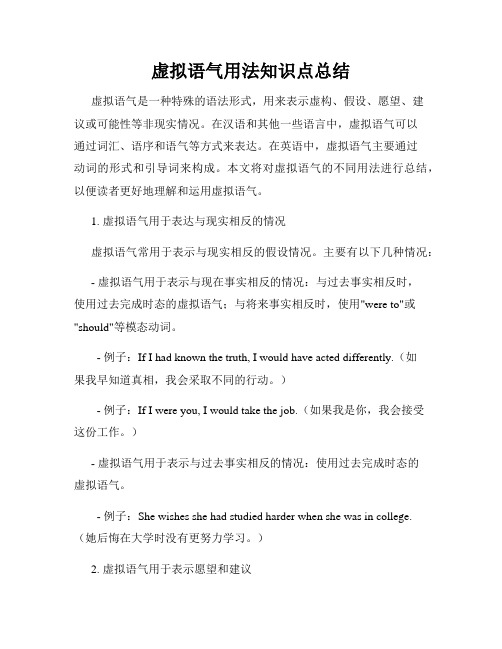
虚拟语气用法知识点总结虚拟语气是一种特殊的语法形式,用来表示虚构、假设、愿望、建议或可能性等非现实情况。
在汉语和其他一些语言中,虚拟语气可以通过词汇、语序和语气等方式来表达。
在英语中,虚拟语气主要通过动词的形式和引导词来构成。
本文将对虚拟语气的不同用法进行总结,以便读者更好地理解和运用虚拟语气。
1. 虚拟语气用于表达与现实相反的情况虚拟语气常用于表示与现实相反的假设情况。
主要有以下几种情况:- 虚拟语气用于表示与现在事实相反的情况:与过去事实相反时,使用过去完成时态的虚拟语气;与将来事实相反时,使用"were to"或"should"等模态动词。
- 例子:If I had known the truth, I would have acted differently.(如果我早知道真相,我会采取不同的行动。
)- 例子:If I were you, I would take the job.(如果我是你,我会接受这份工作。
)- 虚拟语气用于表示与过去事实相反的情况:使用过去完成时态的虚拟语气。
- 例子:She wishes she had studied harder when she was in college.(她后悔在大学时没有更努力学习。
)2. 虚拟语气用于表示愿望和建议虚拟语气还常用于表示愿望和建议。
主要有以下几种情况:- 虚拟语气用于表示与现在的愿望:使用"would rather"或"had better"等模态动词。
- 例子:I would rather you came earlier.(我希望你早点来。
)- 例子:You had better be careful.(你最好小心。
)- 虚拟语气用于表示与将来的愿望:使用"would like to"或"wouldlove to"等词组。
虚拟语气用法梳理

虚拟语气用法梳理虚拟语气是指表达一种假设、愿望、建议、命令、怀疑、推测等非事实情况的语气。
在汉语中,通过词语的选择、语序的改变、虚构语气词等手段来表达虚拟语气。
在英语中,虚拟语气的表达更加规范和明确,有一套独特的语法规则和结构。
一、对过去的虚拟1. 虚拟的动词形式:- 过去式(简单过去时态)常用于表达与过去事实相反的情况,如:I wish I were taller.(我但愿我更高。
)- 过去完成时(had + 过去分词)常用于表示对过去情况的假设,如:If I had studied harder, I would have passed the exam.(如果我当时更努力学习,我就能通过考试。
)- would have + 过去分词用于对过去的事实进行猜测,如:He looks pale as if he would have seen a ghost.(他看起来苍白,好像是看到了鬼。
)2. 虚拟的连接词:- If only(要是...就好了)常用于表达遗憾的气氛,如:If only I had known the truth earlier, I wouldn't have made such a mistake.(要是我早点知道真相,就不会犯这样的错误了。
)- as if / though(好像,仿佛)常用于描述虚构或推测的情况,如:She behaves as if she were the boss.(她的行为好像她是老板。
)二、对现在的虚拟1. 虚拟的动词形式:- 一般现在时(主语+动词原形)与现在事实相反的情况,如:She speaks French as if she were a native speaker.(她说法语就好像是当地人一样。
)- should + 动词原形用于虚拟条件,如:If it should rain, the game would be canceled.(如果下雨的话,比赛将被取消。
虚拟语气用法总结(超好_原创)

虚拟语气概念:谓语v用不同的形式表示说话人的不同意图,这种形式称为语气。
语气分三种:1.陈述语气:用来陈述一个事实,或提出一种看法,有肯定、否定、疑问、感叹等形式。
He is late for class. What fun!He is not interested in classical music.2.祈使语气:用来表示请求、邀请、命令、警告或劝告等(动词常用原形)Don’t be late!3.虚拟语气:表示说话人所说的不是事实,而是一种假设、愿望、怀疑或推测。
一、虚拟语气在if非真实条件句中虚拟条件从句(If) 主句与现在事实相反的假设主语+did/were 主语+should / would/could / might + do与过去事实相反的假设主语+ had done 主语+ should / would/ could / might +have done与将来事实相反的假设主语+1.did主语+should / would/could / might + do2.should do3.were to do1.如果我是你,我会接受他的建议。
If I were you, I would accept his advice.2.如果明天下雨,我会待在家里。
If it rained/should rain/were to rain tomorrow, I would stay at home.3.如果你以前好好学习,你会通过考试的。
If you had studied hard before, you would have passed the exam.You didn’t let me drive. If we ______ in turn, you ______ so tired.A.drove; didn’t getB.drove; wouldn’t getC.were driving; wouldn’t gethad driven; wouldn’t have got________ it rain tomorrow, we would have to put off the visit to the Yang Pu Bridge.A.Were ShouldC.WouldD. Will注意:1.错综时间虚拟语气当从句主句所表示的行为所发生的时间不一致时,动词的形式要根据它所表示的时间作出相应的调整。
- 1、下载文档前请自行甄别文档内容的完整性,平台不提供额外的编辑、内容补充、找答案等附加服务。
- 2、"仅部分预览"的文档,不可在线预览部分如存在完整性等问题,可反馈申请退款(可完整预览的文档不适用该条件!)。
- 3、如文档侵犯您的权益,请联系客服反馈,我们会尽快为您处理(人工客服工作时间:9:00-18:30)。
If we had taken such effective measures much earlier, the river _____ so seriously now.
A.is not polluted
B.would not be polluted
C.had not been polluted
would /could /might visit
I wish (that)he________________(visit) us tomorrow.
I wish (that) he__v_i_si_te_d___(visit)us today. I wish he_h_a_d_v_is_i_te_d_u_s_/_c_o_u_ld__h_a_ve__v_is_it_e_d_u_s_(visit) us yesterday. If only you __h_a_d_li_s_te_n_e_d___ (listen)to our advice!
区别: This is the suggestion that/ which he made at the meeting.(定语从句)
The officer gave the order that nothing ____ until the people arrived. A. didn’t touch B. touched C. be touched D. touch
________ it rain tomorrow, we would have to put off the visit to the Yang Pu Bld
C.Would
D. Will
注意:
1.错综时间虚拟语气
当从句主句所表示的行为所发生的时间不一致 时,动词的形式要根据它所表示的时间作出相 应的调整。
一、虚拟语气在 if非真实条件句中
虚拟条件从句(If)
主句
与现在事实相 反的假设
主语+did/were
与过去事实相
反的假设
主语+ had done
与将来事实相 主语+
反的假设
1.did
2.should do
3.were to do
主语+should / would/ could / might + do 主语+ should / would/ could / might + have done
It is strange that he didn’t come yesterday. It is a pity that she can’t sing.
It is strange that the lazy boy _____ pass the exam.
A. has
B. should
C. would
2.He telephoned to inform me of your birthday, or I would have known nothing about it.
3.I should have given you more help, but I was too busy. 4.What would you do with a million dollars?
注意:若表示的确有某种可能(尤指天气), 也可不用虚拟语气。
Eg. Look! The clouds are gathering.It looks as if it’s going to rain .
When a pencil is partly in a glass of water, it looks as if it ______.
If you ______ with George earlier, you _____ so angry now.
A.talked; would not be B.had talked; would not be C.would talk; would not be D.had talked; would not have been
5.Without / But for your help, we couldn’t have finished the work ahead of time.
=If it had not been for your help, …
Without electricity, human being life ______ quite different today.
If you __h_a_d_f_o_llo_w_e_d__(follow)my advice just now, you __w_o_u_ld_b_e__(be)better now. If you __ha_d__st_u_d_ie_d_(study)hard before, you _w_o_u_ld__b_e(be)a college student now.
虚拟语气
2020/4/12
概念:谓语v用不同的形式表示说话人的不同意图,这 种形式称为语气。语气分三种: 1.陈述语气:用来陈述一个事实,或提出一种看法,有 肯定、否定、疑问、感叹等形式。
He is late for class. What fun!
He is not interested in classical music. 2.祈使语气:用来表示请求、邀请、命令、警告或劝告 等(动词常用原形) Don’t be late! 3.虚拟语气:表示说话人所说的不是事实,而是一种假 设、愿望、怀疑或推测。
I would rather you __h_a_d_n_’t_t_o_ld_ (not tell)me the truth.
5.用于表示 建议(advise/ suggest/ propose/recommend) 命令(order/ command) 要求(demand/require/ request/ desire) 坚持要求(insist) 等词相连的从句中需用虚拟语气: sb (should)+ do 1.I suggested that he (should) go there at once. (宾语从句)
主语+should / would/ could / might + do
1.如果我是你,我会接受他的建议。
If I were you, I would accept his advice.
2.如果明天下雨,我会待在家里。
If it rained/should rain/were to rain tomorrow, I would stay at home. 3.如果你以前好好学习, 你会通过考试的。 If you had studied hard before, you would have passed the exam.
If only I _w_e_r_e_ (be)a bird!
4.在would rather+宾语从句中
与现在或将来事实相反
did/were
与过去事实相反
had done
即:would rather sb did/ had done
I would rather you _c_a_m_e__(come) here tomorrow.
2.My advice is that we (should) tell him the news.
3.I made a suggestion that he------(同位语从句)
4.It is suggested that he------(主语从句)
5.My suggestion was that he-----(表语从句)
D. might
2.If I were you, I would accept his advice. Were I you,……
3.If it rained/should rain/were to rain tomorrow, I would stay at home.
Should it rained tomorrow/ Were it to rain tomorrow,
D.would not have been polluted
2. if从句中,were,had(完成时态标志),should可 以放在句首,(用于倒装结构),if必须省略。否定词 not不能放在前面。
1.Had I not seen him then(Hadn’t I seen him then), I wouldn't have been very happy.
A.is B.will be C.would have been D.would be
But for his help, I ______. A.should not have succeeded B.have not succeeded C.did not succeed D.had not succeeded
I’m getting tired; it’s time we _____ home.
A. go
B. are going
C. went
D. should be going
3.wish/if only(要是……就好了)+从句
与现在事实相反 did/were 与过去事实相反 had done(或用could have done) 与将来事实相反 could/would/might + do
4.If you had studied hard before, you would have passed the exam.
Had you studied hard before,……
3、含蓄虚拟语气 有时为了表达的需要,在虚拟语气中,并不总
